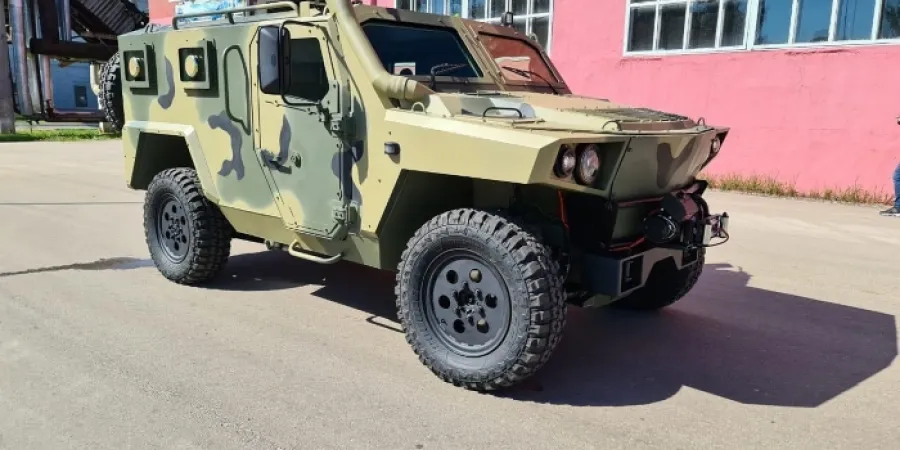Russia's VPK rolls out Strela 4×4 light armored amphibious vehicle
The new Strela is said to have the same level of protection, maneuverability and cross-country capabilities as heavier vehicles
Eyal Boguslavsky
| 07/09/2020
The Janes website reports that Russia’s Military Industrial Company (Russian acronym: VPK) unveiled an amphibious variant of the Strela 4×4 light armored vehicle at the Army-2020 defense exhibition held near Moscow on August 23-29.
VPK Director General Alexander Krasovitskiy told Janes on August 27 that Russia has no amphibious vehicles of this class in its inventory. The vehicle has reportedly passed factory swimming tests. Krasovitskiy said VPK had built the first two Strelas – the utility vehicle and the amphibious platform – under the self-funded program. VPK signed a contract for the development of the Strela family baseline utility vehicle, amphibious platform, low-payload vehicle, and buggy. "The whole family will comprise four vehicles, including two new systems: a multipurpose swimming buggy for airborne soldiers and a soft-skin command-and-control vehicle,” said Krasovitskiy.
The website noted that the use of new technologies and modular layout give the Strela family of vehicles the lowest price tag in their class in Russia, while also having the same protection, maneuverability, and cross-country capabilities as the heavier Tigr and Atlet.
The Strela’s chassis shares maximum commonality with other VPK systems. For example, the armored doors and protected windows are interchangeable with those of the VPK-Ural and Atlet vehicles. The amphibious Strela is 4.7 m long, 2.2 m wide, and 2.1 m high, and weighs 4.9 tons. The payload capacity is 800 kg. The system is powered by a 2.8 liter/200 hp diesel engine, producing a top road speed of 120 km/h, a maximum swimming speed of 7 km/h, and a range of 1,000 km.
The new Strela is said to have the same level of protection, maneuverability and cross-country capabilities as heavier vehicles
The Janes website reports that Russia’s Military Industrial Company (Russian acronym: VPK) unveiled an amphibious variant of the Strela 4×4 light armored vehicle at the Army-2020 defense exhibition held near Moscow on August 23-29.
VPK Director General Alexander Krasovitskiy told Janes on August 27 that Russia has no amphibious vehicles of this class in its inventory. The vehicle has reportedly passed factory swimming tests. Krasovitskiy said VPK had built the first two Strelas – the utility vehicle and the amphibious platform – under the self-funded program. VPK signed a contract for the development of the Strela family baseline utility vehicle, amphibious platform, low-payload vehicle, and buggy. "The whole family will comprise four vehicles, including two new systems: a multipurpose swimming buggy for airborne soldiers and a soft-skin command-and-control vehicle,” said Krasovitskiy.
The website noted that the use of new technologies and modular layout give the Strela family of vehicles the lowest price tag in their class in Russia, while also having the same protection, maneuverability, and cross-country capabilities as the heavier Tigr and Atlet.
The Strela’s chassis shares maximum commonality with other VPK systems. For example, the armored doors and protected windows are interchangeable with those of the VPK-Ural and Atlet vehicles. The amphibious Strela is 4.7 m long, 2.2 m wide, and 2.1 m high, and weighs 4.9 tons. The payload capacity is 800 kg. The system is powered by a 2.8 liter/200 hp diesel engine, producing a top road speed of 120 km/h, a maximum swimming speed of 7 km/h, and a range of 1,000 km.



